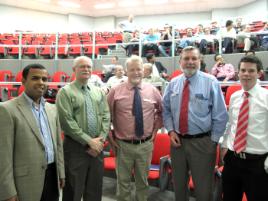Powerful engagement as research links energised
Published on 14 September, 2011
More than 50 power and energy researchers and industry specialists converged on CQUniversity this week for an inaugural seminar on contemporary issues in Power and Energy.
According to CQUniversity's Power Engineering Research Group (PERG) leader Dr Aman Than Oo, the seminar was a huge success with excellent feedback from the industry participants.
"This has further cemented our existing relations with the industry. Industry representatives are impressed with the quality of our research activities and a few organisations approached me after the seminar to collaborate with them."
Dr Maung Than Oo says there is now more than ever "a need for robust, sustainable and climate-friendly power transmission and distribution systems that are intelligent, reliable and able to integrate renewable energy sources to replace aging networks, as well as for new developments".
Participants heard from guest speakers Professor Peter Wolfs and Ted Gardner.
Professor Wolfs, the Western Power Chair in Electrical Engineering at Curtin University of Technology, provided insight into smart grids, storage and renewables.
His presentation covered new approaches in power distribution modelling, the potential impacts of new load groups such as electric vehicles and the impact of an increasing take-up of rooftop solar systems. He also discussed some early results from the Perth Solar City high penetration LV feeder trial.
Ted Gardner, who is a Senior Research Fellow with CQUniversity's Institute for Resource Industries and Sustainability (IRIS), discussed how the impending threat of climate change has changed the fundamental paradigm for supplying basic services to urban communities.
His presentation focused on results from a number of sustainable urban developments that have been monitored over the past few years. Particular attention was paid to The Ecovillage in the Currumbin Valley on the Gold Coast.
Mr Gardner's presentation drew on 40 years' experience in the area of edaphology (soil/plant relationships), irrigation and catchment hydrology/salinity, effluent reuse, and urban water sustainability.


